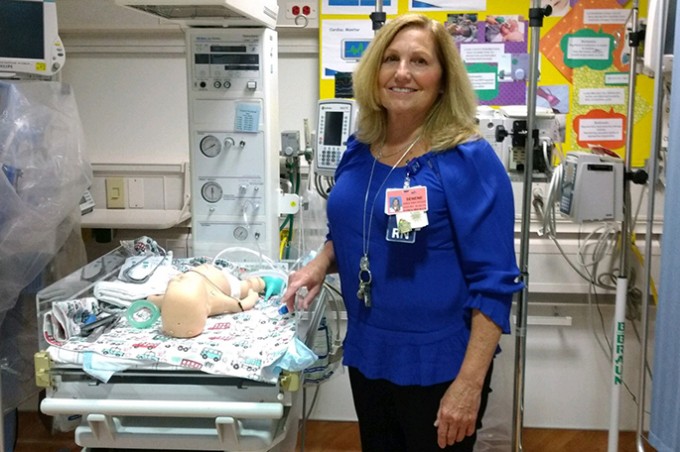My Specialty
CNS Educator, Senene Owen, Methodist Hospital of Southern California
Caring for high-acuity infant patients

Senene Owen, RNC, MSN, CNS, CPNP
Clinical Nurse Specialist/Educator
Methodist Hospital of Southern California
Please tell us about the arc of your nursing career.
Before I earned my nursing degree, I worked at several different homes, caring for severely handicapped infants and children with special needs. That work had a great impact on my life and goals. In my first nursing position, at another facility, I was able to float to many different areas, including ICU, NICU and labor & delivery.
When I came to Methodist, I started off in the surgical ICU, where I remained for 10 years. I loved caring for neuro patients, especially neurosurgical patients with ICP [intracranial pressure] monitoring. I also enjoyed working with post-op cardiac patients and patients requiring invasive monitoring.
When I went into premature labor with my son, he spent a month in the NICU. As I cared for him, it became clear that I needed to work in an NICU. So, when Methodist opened their own unit, it was personally and professionally exciting to be involved in getting it off the ground. I worked as frontline NICU bedside staff for 18 years.
How did you become interested in becoming a clinical nurse specialist (CNS)?
Some of my role models in the NICU were the parent/child clinical nurse specialists. They were able to promote change, educate staff and improve patient outcomes, which showed me the kind of nurse I wanted to be.
What functions do you perform as a CNS?
I provide education for the staff, teach house-wide orientations, train new staff, and plan and facilitate our Skills Day. Other responsibilities include facilitating our malignant hyperthermia drills for the OR, PACU and L & D; writing and revising policies and procedures for maternal/child and nursing; and obtaining supplies and equipment.
I also attend some deliveries and provide care for some babies in the NICU.
I take part in many meetings that may involve the approval of new policies, which as well as the planning and facilitation of our neonatal mortality and morbidity conferences.
In the course of my work, I collaborate with neonatologists, obstetricians and other providers. We all take part in multidisciplinary rounds.
Do you only educate nurses or do you also work with other allied professionals?
The NICU respiratory care practitioners (RCPs) and RNs complete their education and Skills Day together — they’re a team. The RCPs are very important in the care of babies during delivery and in the NICU.
We do a lot of simulation so the staff can practice skills and communication. We also do education with social workers and OTs. (OTs actually feed the babies in the NICU.) Also, we have mortality and morbidity conferences for all disciplines. Another of my contributions is educating patients and their families, mostly in the context of families with babies in the NICU.












